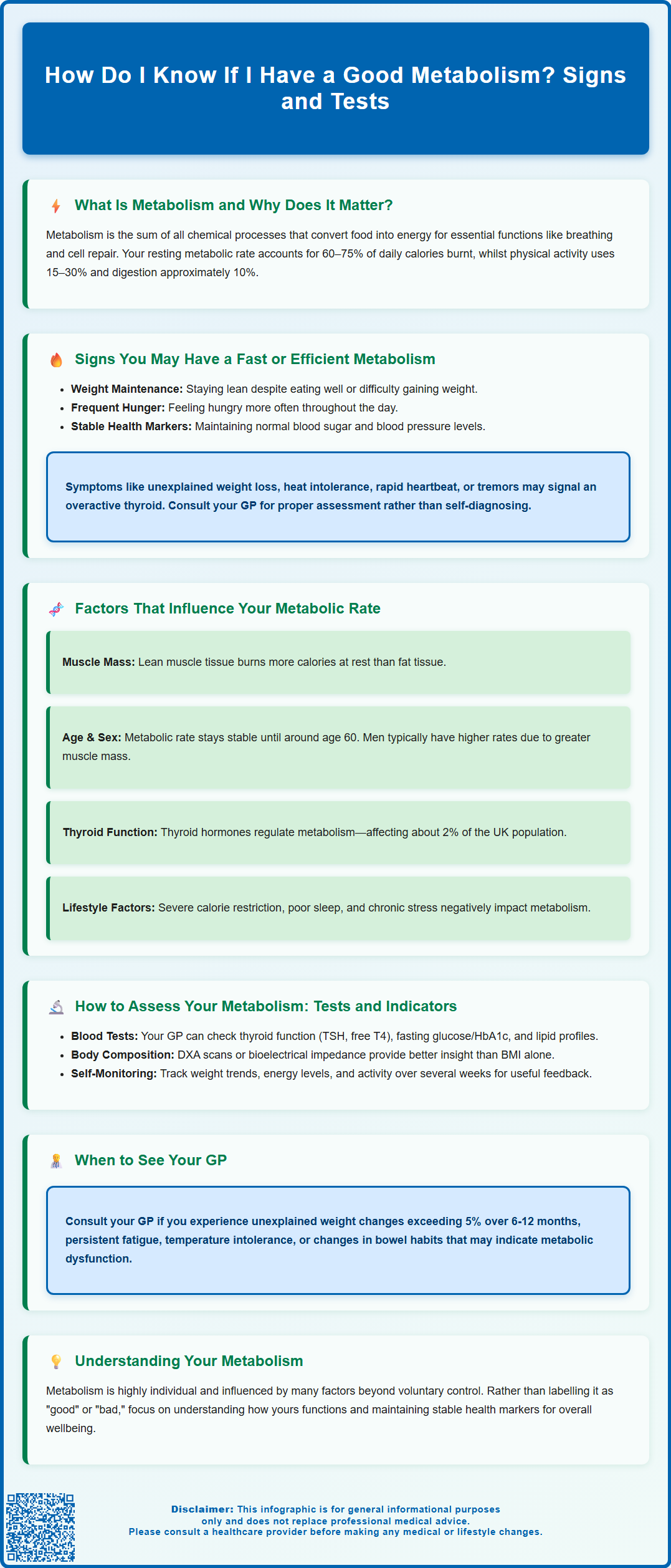Many people wonder whether their metabolism is working efficiently, particularly when managing body weight or energy levels. Metabolism encompasses all chemical processes that convert food into energy, with your metabolic rate determining how quickly your body burns calories. Whilst terms like 'fast' or 'slow' metabolism are commonly used, metabolic function exists on a spectrum influenced by genetics, body composition, thyroid function, and lifestyle factors. Understanding the signs of healthy metabolic function—and recognising when symptoms warrant medical assessment—can help you make informed decisions about your health and wellbeing.
Summary: You can assess your metabolic health through observable patterns like stable weight maintenance, consistent energy levels, and clinical tests including thyroid function and glucose metabolism markers.
- Resting metabolic rate accounts for 60–75% of total daily energy expenditure and is influenced by muscle mass, age, sex, and genetics.
- Thyroid function tests (TSH and free T4) can identify metabolic disorders, as thyroid hormones are primary regulators of metabolic rate.
- Unexplained weight loss, heat intolerance, palpitations, or persistent fatigue may indicate hyperthyroidism requiring GP assessment.
- Body composition, particularly lean muscle mass, significantly affects metabolic rate as muscle tissue burns more calories at rest than adipose tissue.
- Metabolic rate remains relatively stable from early adulthood until approximately age 60, when age-related decline becomes more pronounced.
Table of Contents
What Is Metabolism and Why Does It Matter?
Metabolism refers to the sum of all chemical processes that occur within your body to maintain life. These processes convert the food and drink you consume into energy, which your body uses for everything from breathing and circulating blood to repairing cells and supporting physical activity. Your metabolic rate is the speed at which these processes occur, typically measured as the number of calories your body burns over a given period.
The largest component of your metabolism is your resting metabolic rate (RMR) , which accounts for approximately 60–75% of your total daily energy expenditure. This represents the energy required to maintain essential physiological functions whilst at rest—such as maintaining body temperature, supporting cardiac and respiratory function, and enabling cellular repair. The remaining energy expenditure comes from physical activity (15–30%) and the thermic effect of food (approximately 10%), which is the energy required to digest, absorb, and process nutrients.
Understanding your metabolism matters because it influences body weight regulation, energy levels, and overall health. A well-functioning metabolism efficiently converts nutrients into usable energy, supports healthy body composition, and helps maintain stable blood glucose levels. Conversely, metabolic dysfunction can contribute to conditions such as obesity, type 2 diabetes, and cardiovascular disease. However, it is important to recognise that metabolism is highly individual and influenced by numerous factors, many of which are beyond voluntary control. Rather than labelling metabolism as simply 'good' or 'bad', it is more clinically useful to understand how your metabolic rate functions and what factors influence it.
Signs You May Have a Fast or Efficient Metabolism
Identifying whether you have a relatively fast metabolism can be challenging, as metabolic rate exists on a spectrum and varies considerably between individuals. However, certain observable patterns may suggest a higher-than-average metabolic rate.
Possible indicators of a faster metabolism include:
-
Maintaining a stable, lower body weight despite consuming adequate or generous portions of food
-
Difficulty gaining weight even when attempting to increase caloric intake deliberately
-
Feeling hungry frequently, as your body processes and utilises nutrients more rapidly
It is crucial to emphasise that these signs are not diagnostic and can be influenced by numerous other factors, including physical activity levels, dietary composition, sleep quality, stress, and underlying medical conditions.
Warning signs that require GP assessment:
Some symptoms that might seem like a 'fast metabolism' could actually indicate an overactive thyroid (hyperthyroidism), which requires medical attention. These include:
-
Unexplained weight loss despite normal or increased appetite
-
Persistent feelings of heat intolerance or excessive sweating
-
Heart palpitations or unusually rapid heartbeat
-
Tremors or shakiness
-
Anxiety, irritability, or mood changes
-
Fatigue or muscle weakness
-
Changes in bowel habits
A truly healthy metabolism is one that appropriately matches energy expenditure to physiological needs, maintains stable body composition, and supports optimal health markers such as normal blood glucose, lipid profiles, and blood pressure. If you experience unexplained weight changes, persistent fatigue, or other concerning symptoms, it is advisable to consult your GP for proper assessment rather than self-diagnosing based on perceived metabolic rate.

Factors That Influence Your Metabolic Rate
Metabolic rate is determined by a complex interplay of genetic, physiological, and environmental factors, many of which are not modifiable through lifestyle interventions alone.
Key determinants of metabolic rate include:
Body composition: Lean muscle tissue is metabolically more active than adipose (fat) tissue, burning more calories at rest. Individuals with greater muscle mass typically have higher resting metabolic rates.
Age: Recent research suggests that metabolic rate remains relatively stable from early adulthood until around age 60, after which it begins to decline more noticeably. This later-life decline is partly attributable to age-related loss of muscle mass (sarcopenia) and changes in hormonal profiles.
Sex: Men generally have higher metabolic rates than women, primarily due to greater muscle mass and lower body fat percentages. Hormonal differences, particularly in testosterone and oestrogen levels, also contribute to this variation.
Genetics: Inherited factors influence inter-individual variation in metabolic rate. Genetic differences affecting thyroid function, mitochondrial efficiency, and hormone receptor sensitivity all influence baseline metabolism.
Thyroid function: Thyroid hormones (T3 and T4) are primary regulators of metabolic rate. Hypothyroidism (underactive thyroid) slows metabolism, whilst hyperthyroidism (overactive thyroid) accelerates it. The NHS estimates that approximately 2% of the UK population has an underactive thyroid.
Physical activity: Both structured exercise and non-exercise activity thermogenesis (NEAT)—the energy expended during daily activities like walking, fidgeting, and maintaining posture—significantly influence total daily energy expenditure.
Dietary factors: Severe caloric restriction can trigger 'metabolic adaptation', where the body reduces energy expenditure to conserve resources. Protein intake also affects metabolism through its higher thermic effect compared to carbohydrates and fats.
Sleep and stress: Chronic sleep deprivation and elevated cortisol levels from persistent stress can negatively impact metabolic function, affecting insulin sensitivity and appetite regulation.
How to Assess Your Metabolism: Tests and Indicators
If you wish to gain objective insight into your metabolic function, several assessment methods are available, ranging from simple clinical observations to sophisticated laboratory testing.
Clinical assessments your GP may perform:
-
Thyroid function tests: Measuring serum thyroid-stimulating hormone (TSH) and free T4 can identify thyroid disorders affecting metabolism. Free T3 is not routinely tested for suspected hypothyroidism but may be measured in specific scenarios such as suspected thyrotoxicosis, in line with NICE guidance.
-
Fasting glucose and HbA1c: These tests assess glucose metabolism and can identify non-diabetic hyperglycaemia (NDH, formerly called prediabetes) or type 2 diabetes. In the UK, NDH is defined as HbA1c of 42–47 mmol/mol, while diabetes is diagnosed at ≥48 mmol/mol.
-
Lipid profile: Measuring total cholesterol, LDL, HDL, and triglycerides provides insight into lipid metabolism and cardiovascular risk, as outlined in NICE guidance on cardiovascular disease risk assessment.
-
Body composition analysis: Whilst basic BMI calculations have limitations, more sophisticated methods like bioelectrical impedance analysis (BIA) or DXA scans can estimate muscle and fat mass, informing metabolic assessment. Note that BIA accuracy varies with hydration status and device quality.
Specialised metabolic testing:
Indirect calorimetry measures oxygen consumption and carbon dioxide production to calculate resting metabolic rate with reasonable accuracy. This test is occasionally available through specialist NHS services or private clinics but is not routinely necessary for most individuals.
Practical self-monitoring approaches:
Whilst not providing precise metabolic measurements, tracking your body weight trends, energy levels, dietary intake, and physical activity over several weeks can offer useful insights into how your body responds to energy balance. However, it is important to interpret these observations cautiously and avoid obsessive monitoring, which can contribute to disordered eating patterns.
When to seek medical advice:
Consult your GP if you experience unexplained weight changes (gain or loss of more than 5% body weight over 6–12 months), persistent fatigue, heat or cold intolerance, changes in bowel habits, or other symptoms suggesting metabolic or endocrine dysfunction. Your GP can arrange appropriate investigations and, if necessary, refer you to an endocrinologist for specialist assessment. Remember that metabolism is just one aspect of overall health, and focusing excessively on metabolic rate can be counterproductive to wellbeing.
Frequently Asked Questions
What blood tests can check my metabolism?
Your GP can arrange thyroid function tests (TSH and free T4), fasting glucose or HbA1c to assess glucose metabolism, and lipid profiles to evaluate cholesterol and triglyceride levels. These tests identify metabolic or endocrine disorders affecting how your body processes energy.
Can you speed up a slow metabolism?
Whilst you cannot dramatically alter your baseline metabolic rate, building lean muscle mass through resistance training, maintaining adequate protein intake, staying physically active, and ensuring sufficient sleep can optimise metabolic function within your genetic parameters.
When should I see my GP about metabolism concerns?
Consult your GP if you experience unexplained weight changes (more than 5% over 6–12 months), persistent fatigue, heat or cold intolerance, heart palpitations, or changes in bowel habits, as these may indicate thyroid or metabolic disorders requiring investigation.
The health-related content published on this site is based on credible scientific sources and is periodically reviewed to ensure accuracy and relevance. Although we aim to reflect the most current medical knowledge, the material is meant for general education and awareness only.
The information on this site is not a substitute for professional medical advice. For any health concerns, please speak with a qualified medical professional. By using this information, you acknowledge responsibility for any decisions made and understand we are not liable for any consequences that may result.
Heading 1
Heading 2
Heading 3
Heading 4
Heading 5
Heading 6
Lorem ipsum dolor sit amet, consectetur adipiscing elit, sed do eiusmod tempor incididunt ut labore et dolore magna aliqua. Ut enim ad minim veniam, quis nostrud exercitation ullamco laboris nisi ut aliquip ex ea commodo consequat. Duis aute irure dolor in reprehenderit in voluptate velit esse cillum dolore eu fugiat nulla pariatur.
Block quote
Ordered list
- Item 1
- Item 2
- Item 3
Unordered list
- Item A
- Item B
- Item C
Bold text
Emphasis
Superscript
Subscript












